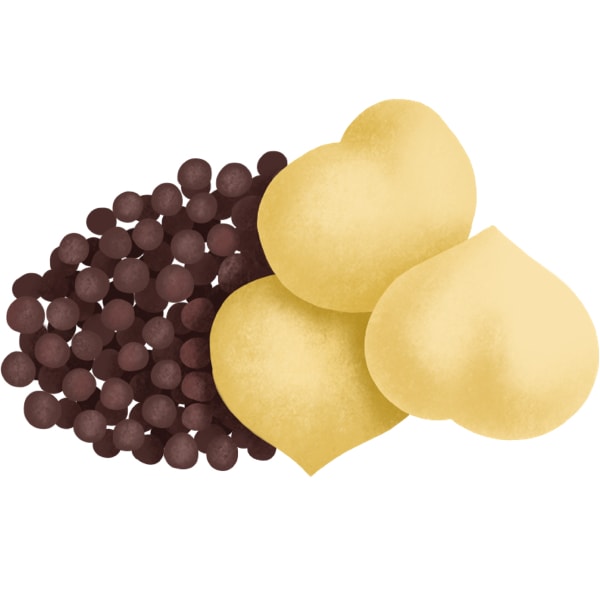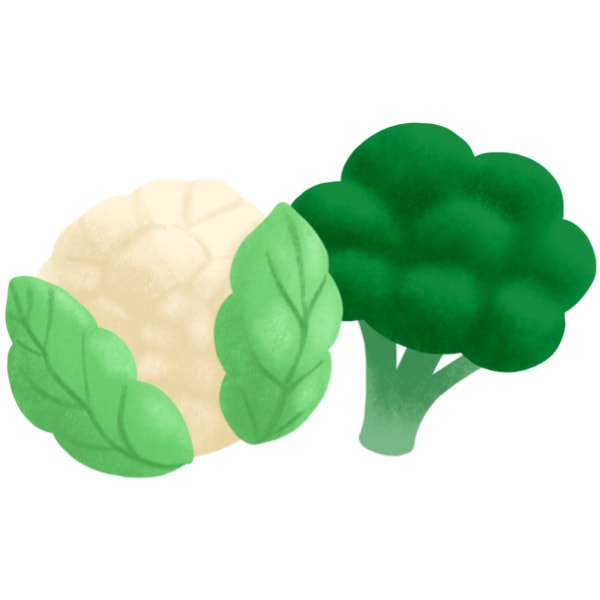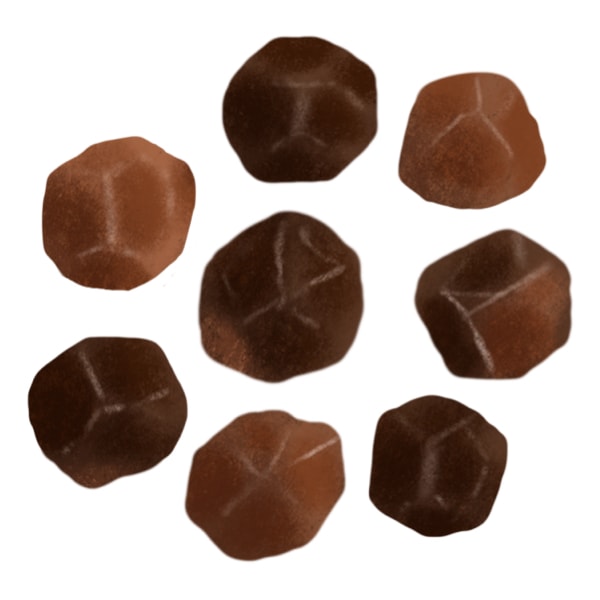
Good sleep is inseparable from good health. In fact, lack of sleep can increase the risks of cardiovascular disease, weight gain, diabetes, or even depression.
Our diet directly influences the quality of our sleep. As such, maintaining an appropriate diet throughout the day helps us to benefit from a good night’s rest.
Alongside nutritionist Anthony Berthou, we explain in this article which types of nutrition to choose in order to optimize your sleep.
Our bodies follow 24-hour rhythms
Almost all of our body’s biological functions are regulated by 24-hour cycles: that’s what we call our circadian rhythm. Our internal clock acts as the conductor that will regulate different function’s circadian rhythms. In this way, it will control the production of the sleep hormone (melatonin) at the end of the day and the awake hormone (dopamine) in the morning, helps lower our body temperature and heart rate at night, and even manage memory consolidation during our sleep.
An important element will help our biological clocks to synchronize with a 24-hour rhythm: light. You see, the retina will capture variations in light, which will effectively tell our brains to secrete the appropriate daytime or nighttime hormones, making us awake or sleepy.
The sleep cycle
Our sleep is made up of a series of approximately 90-minute cycles, ranging from 4 to 6 cycles per night. Each cycle is comprised of different phases:
- Light sleep, which lasts about 20 minutes
- Deep sleep, which is very restorative
- REM (rapid eye movement) sleep, which is the period in which we dream
In order to optimize your sleep, it is important for the moment we fall asleep to align as closely as possible to the moment when we naturally begin our first cycle. Conversely, when there is more time that passes between falling asleep and the beginning of the first cycle, you may feel your sleep wasn’t restorative.
To identify the beginning of our sleep cycle, the body sends us different signals: yawns, irritated eyes, drowsiness, concentration problems… So, it is essential to go to bed at the first indications of fatigue in order to not miss the “sleep train.”
Which food for which meal?
Neurotransmitters are vital to our circadian rhythm regulation:
- In the morning, we need dopamine and norepinephrine, which are going to be our basis for waking up and getting motivated.
- At night, we need serotonin and melatonin, which are responsible for calming down and regulating sleep.
That’s why it is necessary to prioritize a diet that boosts the production of these neurotransmitters at the right times of day.
1) Breakfast
For breakfast, it is recommended to consume a source of animal protein. These will promote dopamine production, which will stimulate us waking up and feeling motivated. Besides boosting our motivation and alertness, this dopamine production will maximize our circadian rhythm regulation. So, we are getting ready for bed as soon as we eat breakfast!
You can, for example, opt for:
 | 1 or 2 eggs |
 | or 1 yogurt (goat or sheep’s milk) |
 | or 1 ounce of cheese |
 | or 1 piece of high quality ham |
There are also plant-based alternatives, especially nuts (almonds, walnuts, cashews, etc.). Chia seeds are another vegetarian alternative, even though they contain less protein per portion.
👉 Check out our article on the ideal breakfast
2) Lunch
At mid-day, it is also recommended to have some protein – animal or plant – in order have enough energy to last until the end of the day. For example, you can go for:
 | 4.2 oz of fish or poultry |
 | or 2 eggs |
 | or 4.2 oz of tofu |
 | or 5.3 oz of cooked legumes (lentils, beans, chickpeas, etc.) even if they are not the ideal option because of their carbohydrate content |
These proteins should be paired with fiber-rich legumes will help you feel full and whose low glycemic index will allow for a steady release of energy in the body.
👉 Check out our article on the ideal lunch
3) Snack
For a snack, you can choose a fruit or two pieces of dark chocolate. They will serve as your carbohydrate intake: via insulin secretion, these carbohydrates will promote the production of serotonin, the neurotransmitter which is responsible for relaxation and wellbeing.
Pair this carb intake with a small handful of fatty acids (ideally walnuts and almonds), which will provide tryptophan, an amino acid from which serotonin will be synthesized.
👉 Check out our article on the ideal snack
4) Dinner
In the evening, choose a vegetarian meal without meat, fish, or eggs! In fact, tyrosine – present mostly in animal proteins – promotes dopamine production, a neurotransmitter fuels our experience of waking up and being motivated. If dopamine is ideal in the morning for getting ready, then at night our body needs to produce serotonin, a neurotransmitter responsible for calming down and regulating sleep. This serotonin is synthesized by tryptophan, an amino acid that we find in plant-based proteins: legumes, soy, wholegrain rice, sunflower seeds, chocolate…
Additionally, animal proteins contain amino acids which compete with tryptophan. These amino acids will slow down the tryptophan’s path to the brain; as such, it is not absorbed as well, which affects serotonin production, and therefore, sleep.
Lastly, animal proteins (and cooked fats in particular) put too much stress on our bodies in the evening because their digestion time is longer. The body is going to have to produce more energy, and therefore more heat, to allow this digestion. However, our bodies need to lower their temperature at night in order to sleep.
So, instead, opt for a portion of vegetable protein, as well as for foods which promote serotonin production:
 | Walnuts and almonds |
 | Yogurts and cheese |
 | Carbohydrates (whole grains or fruits) |
👉 Check out our article on the ideal dinner
Sleep disruptors
Several factors can interfere with sleep and prevent restorative rest.
Dietary disruptors:
 | 1) Coffee Due to its caffeine quantity, coffee stimulates the nervous system for 6 hours after its consumption. To a lesser extent, tea also helps to stimulate our brains. |
 | 2) Alcohol Even though it leads to drowsiness, alcohol also creates a release of adrenaline throughout the night and lowers melatonin levels. |
 | 3) Excess animal protein at dinner As we’ve seen, it is better to go for vegetable proteins at night, which contain carbohydrates and tryptophan which will allow for serotonin synthesis. |
 | 4) Cabbage and fermented foods Cabbage and fermented foods like sauerkraut can lead to bloating and therefore reduce the quality of your sleep. |
 | 5) Spices Spices – like pepper, paprika, or chili –should be avoided at night for people with gastrointestinal sensitivities. |
 | 6) Fried fatty foods Cooked fats – especially those that are fried – increase digestion time and can therefore disrupt sleep. |
Optimize your magnesium intake!
Magnesium deficiencies are common. These deficiencies can present themselves through different ways which can disrupt sleep: sensitivity to stress, irritability, anxiety, nervousness, night cramps…
Foods with the richest magnesium content are the following:
- Dark chocolate (min. 70% cocoa)
- Nuts (walnuts, almonds, cashews, peanuts, hazelnuts…)
- Legumes (lentils, chickpeas, white beans…)
- Whole grains (buckwheat, oats, rye, brown rice…)
- Sardines in oil
- Seafood
- Spinach
- Figs
Other disruptors:
 | 1) Stress and anxiety Stress and anxiety affect the quality of our sleep: they create difficulties falling asleep and can lead to insomnia. Mindfulness meditation and even self-hypnosis are practices that can help to reduce stress levels before going to bed. |
 | 2) Blue light The use of screens (computer, tv, phone) at night should be eliminated. These screens produce a blue light which activates up to 100 times more photoreceptors than white light does. As a result, they disrupt our natural circadian rhythm and reduce our sleep time. So, avoid screens as much as possible before going to sleep. The French Agency for Food, Environmental and Occupational Health & Safety (ANSES) recommends limiting the use of LED devices, which are richest in blue light. It is also necessary to fall asleep in a dark environment in order to promote melatonin secretion. |
 | 3) Heat At night, our bodies need to lower their temperature in order to have quality sleep. So, avoid hot baths and showers before going to bed and remember to cool down your room at night to an ideal 62.5°F. |
With all of these tips, wishing you good night’s sleep 🌙
- Knutson KL, Spiegel K, Penev P, Van Cauter E. The metabolic consequences of sleep deprivation. Sleep Med Rev. 2007 Jun;11(3):163-78.
- Hercberg S, Galan P, Preziosi P, Bertrais S, Mennen L, Malvy D, Roussel AM, Favier A, Briançon S. The SU.VI.MAX Study: a randomized, placebo-controlled trial of the health effects of antioxidant vitamins and minerals. Arch Intern Med. 2004 Nov 22;164(21):2335-42. Erratum in: Arch Intern Med. 2005 Feb 14;165(3):286. PubMed PMID: 15557412.
- Colzato LS, Jongkees BJ, Sellaro R, van den Wildenberg WP, Hommel B. Eating to stop: tyrosine supplementation enhances inhibitory control but not response execution. Neuropsychologia. 2014 Sep;62:398-402.
- Ohayon MM. Epidemiology of insomnia: what we know and what we still need to learn. Sleep Med Rev. 2002 Apr;6(2):97-111.
- Markus CR, Jonkman LM, Lammers JH, Deutz NE, Messer MH, Rigtering N. Evening intake of alpha-lactalbumin increases plasma tryptophan availability and improves morning alertness and brain measures of attention. Am J Clin Nutr. 2005 May;81(5):1026-33.
- Møller SE. Carbohydrate/protein selection in a single meal correlated with plasma tryptophan and tyrosine ratios to neutral amino acids in fasting individuals. Physiol Behav. 1986;38(2):175-83.
- Spiegel K, Knutson K, Leproult R, Tasali E, Van Cauter E. Sleep loss: a novel risk factor for insulin resistance and Type 2 diabetes. J Appl Physiol (1985). 2005 Nov;99(5):2008-19.
- Van Cauter E, Holmback U, Knutson K, Leproult R, Miller A, Nedeltcheva A, Pannain S, Penev P, Tasali E, Spiegel K. Impact of sleep and sleep loss on neuroendocrine and metabolic function. Horm Res. 2007;67 Suppl 1:2-9.
- Wurtman RJ, Wurtman JJ, Regan MM, McDermott JM, Tsay RH, Breu JJ. Effects of normal meals rich in carbohydrates or proteins on plasma tryptophan and tyrosine ratios. Am J Clin Nutr. 2003 Jan;77(1):128-32.
- Anses - https://www.anses.fr/fr/content/led-les-recommandations-de-l%E2%80%99anses-pour-limiter-l%E2%80%99exposition-%C3%A0-la-lumi%C3%A8re-bleue
- Article Yuka sur le petit déjeuner : https://yuka.io/fondamentaux/petit-dejeuner-ideal/
- Article Yuka sur le déjeuner : https://yuka.io/fondamentaux/le-dejeuner/
- Article Yuka sur le goûter : https://yuka.io/fondamentaux/le-gouter/
- Article Yuka sur le dîner : https://yuka.io/fondamentaux/le-diner/








Thankyou for creating this app , so appreciative.
My sister found this app from a man in a wheelchair as he was shopping . I was wondering why she came home later. She had downloaded the app and while she was in the grocery store she went to check out different types of food. She arrived as happy as a clam–all but giddy. I love that you give us other similar food products. I picked up a box of Great Value Corn flakes. They tasted so good.
The app and the articles via Yuka are extremely useful, easily comprehended, and very relevant. I love Yuka ! I’m very appreciative such great information is at hand.
I love love love your app!
Great information. Thank you.
Thank you
Very helpful information.
Why don’t you become a non profit since you are impartial and it will make the payments to you tax deductible.
Thanks for the consideration
A lot of great information. Seeing more information on how to eat at night for better sleep and it’s working. I will say I had a little giggle when you mention eating avocados only occasionally because of the environmental impact but make no mention of the environmental impact of eating meat. Cheers
I love this app! I use it regularly to locate the most healthy, low risk foods.
I appreciate the educational information you provide and healthier alternatives.
Thank you for the article. It was informative. Our grocery items are scanned on the Yuka app when we shop for groceries. We are still looking for Yuka approved butter.
What does Sex do for our bodies. Is it better in the Morning or night
Great info.
https://sites.google.com/view/where-can-i-buy-mitolyn/
Hi Julie and Anthony,
Enjoyed reading your article, as usual combined with your Yuka app we have the power to make the right decisions in our shopping trips.
Have spread the Yuka app in Canada and the US with a great response.
Thank-you and all the best in your ongoing adventure!
Thank you so much for the info on sleep patterns. I learned much needed advice and what I need to change (which is more than I thought)! I always shop with Yuka app and have recommended it to many. Keep up the important work!
Excellent article!!!
It’s a great article for our life. Thanks a lot
Love this information, will apply to my everyday life ,
Good article. Learned some things I didnt know about promoting a good night sleep.
Love using my Yuka app while shopping. Its made a huge differece in what I choose to buy. I have asthma and additives & preservations have been know to trigger an attack. Thank you.
This was such a helpful article. Straightforward and broke things down amazingly
Definitely a wakeup call for me. Especially with the before bed points made. Gotta turn down the heat in the bedroom.
💡👍🏻👏🏼
This article was very informative, doable changes I can make, and quick to read. Thank you!!!
Hello,
Thank you for this information. I am trying not to eat heavy meals close to bedtime. I try to eat my heaviest meals during the day, but that does not always work. Also, I used your scanner to help me make healthier choices.
This was very informative as I have suffered with insomnia for over 10 years Iam definitely going to try these suggestions and I Love My Yuka app.
Very informative and interesting. Thank you so much for this article. I always do my shopping with my Yuka app, sometimes people ask me about me scanning food and I gladly tell them about your app. I love it!
Sleep is crucial. Appreciate the help understanding food consumption for better sleep
Love the app but I would like to see protein powders referenced
This is a fabulous, concise, easy to follow article. Thank you!
Thank you,good information
Thanks for the helpful information.
Thanks for the very interesting information. It was especially surprised about not having meat at night
These suggestions of food choices are not helpful for those who eat a whole food plant-based, no added sugar, salt, or oil.
I thought I knew a lot about foods. Your article added more depth to my understanding of food choices.
Great article! I thought I knew a lot about foods. Your article added more depth to my understanding of food choices.
A friend in the UK provided the link to the Yuka App and I wasn’t sure if it would work in Australia, but it does! I spent 20 minutes scanning everything in my fridge and pantry and was shocked at the results! I thought I was buying all the good stuff, but not so!!
Thank you so much…gonna give the suggestions a try.
I loved this informational email
Thank you so much.
provide some more vegetarian options but good information
Excellent
I skimmed this article. I didn’t need to read it fully to know that aspartame is poison in your system. Many years ago I was addicted to Diet Pepsi. I consumed copious amounts daily. I also suffered from frequent migraines which would seem to be triggered by certain foods like Chinese dishes, red wine, chocolate etc. I went to a number of doctors for an answer but got no positive results.
One day my husband observed that he felt this over consumption of Diet Pepsi wasn’t good for me. I agreed with him and stopped drinking it completely. That wasn’t easy but I persevered and noticed that the migraines were coming less frequently. I consumed some of the triggers and sure enough I could usually eat these foods without a problem. The occasional migraine was less severe.
I thought to myself, what has happened in my life that would have prompted this change? It suddenly dawned on me that the lack of Diet Pepsi in my life could have been a motivator. I looked at it more closely and decided that the aspartame was probably the trigger. I looked at other items in my diet and found that Equal sugar substitute was nothing but aspartame. I got rid of that too. Lo and behold, my migraines were gone forever.
It’s probably been 30 years since I’ve had a migraine and you can bet I warn others about the hazards of consuming this toxic chemical. I’m well aware that money greatly influences what happens in the world. Look at what’s happening today. It’s a travesty. Our healthcare system in the USA is a joke. How sad. We are being run by a bunch of delusional idiots with no scientific foundation whatsoever. I hope people wake up and vote for responsible candidates that actually care about their constituents and aren’t afraid to speak out against this corruption and lunacy.
Great info I always trust and depend on Yuka !!
I like Yuka very much, it has changed my diet for the better. I now try to pick the healthiest product I can. I feel better.
Thank you for the article. I enjoy Yuka very much.
I noticed your ingredient amount information for sugar and calories is incorrect on Aldi Sparkling Juice. What you have in Yuca is different from what is on the can.
Why are you using US measurement units for these kind of articles?
You know your app is used around the world and the USA accounts only for 4% of the total world population?
This is surprising, taking into account most of the Yuka team is from Europe. We paying Yuka customers from around the world could also get some value from these articles…
Thank you for the sleep tips!
Good Stuff
GREAT INFO. I WILL BE TRYING IT!
Thank you for this informative article – always learning information that adds to a healthier lifestyle – Yuka is a good tool for better living – thank you
Thank you for this informative article!
Great article! Love the app too.
Great info .Thanks
Thank you for this extremely helpful information!
I found this article so informative. Looks like I was doing it all wrong. I will try this suggestion as I have sleep issues.
This is an interesting take on diet – almost opposite of what most people seem to think!
God bless,
Thank you! For sharing so helpful information🙏❤️
Yuka’s work is pure reason!
Thank you for the information.
Thank you for all your info to help us get healthy.
This is most helpful.
Good article. Everyone with Celiac Disease should be a member of Yuka. So helpful when grocery shopping to assure your foods are gluten free! Also recommends healthier options of Gluten free foods. I use this all the time
I shop and scan products when shopping . Very interesting what YUKA has to say about some of the( organic) products. I use common sense also.
Thankyou.
I will follow these steps for a better health
and happy eating routine and can you
please please please send more recipes for
healthy eating
I will follow these steps for a better health and happy eating routine
Great info and food tips
Thank you very much
THANK YOU SO MUCH! for your amazing article. I now struggle with sleep. I never thought that was possible. I now load up on magnesium, D3+K2, and B1 at night. They help me drift off and then I get the dreaded wakeup around 4am. I appreciate you outlining the best foods for morning and evening. Thank you. I enjoy your articles so much.
Thank you for this good information. I am appreciative and obsessed with the Yuka app. It is so helpful to make better food and cosmetic choices. Thank you for also providing alternative recommendations for poor products
This is so helpful, thank you!
What a helpful article! Appreciated the tips.
It 8s helpful information. I would try to use it.
Thank you
Thank you great information.
I am a cyclist what food should I eat to keep me healthy while I’m riding my bicycle long miles. Thank you for all your help.
Great information. Thank you
Very good information.
I’ enjoyed ur ur indf. Thank u so much 💓
Julie, merci beaucoup pour les informations.
Marc
Fantastic. Thanks
Great article and visuals
I use the Yuka app every time I go into the grocery store. I’ve learned a lot about what products are clean and which ones are not. I love that the app gives me alternatives to those products that come up with a poor score.
Thank you!
Good article. Thanks
Thank you for this information the balance and time of types of food groups makes a lot of sense.
Thank you. I’ll keep following!
It makes sense now 😃
I am greatly pleased with the Yuka app and their regular advice articles. I think it’s important to remember that the articles, especially this one on sleep, are general guidelines. YRMV, as the internet acronym states, Your Results May Vary. In my much younger years I could down a couple of sodas and then rack out for 6-8 hours with no problem. Decades later I seem to always struggle to figure out what is affecting me THIS time (did I have too much sugar? was it those highly-rated natural chips? was it the salad from lunch?), but I appreciate the information and will see how it works for me. Please keep up the great work!
I am on a low sodium diet of 2000mg per day. Needless to say, that means no eating out as just about every item on restaurant menus are over 1000 mg, so one meal can easily meet my daily quota. I also need to watch my Oxalate intake. Calcium oxalate kidney stones are associated with sodium and oxalates. It would be nice to see an article about reducing kidney stones.
Amazing article with specific details about the food that affects our sleep!! Thank you so much YUKA team!!! I truly appreciate all that your team are doing to help us understand healthy habits to improve our way of life and how a good night of sleep can change how we feel during the day. Please continue your great work!! Love your YUKA App.
Great article! Good advice!
This article was eye opening regarding the evening meals. Frankly I am not sure how to readjust. My husband looks forward to
dinner that usually consist of meat.
The article was simple and quite understandable.
Thank you so much.
66 and a poor sleeper. I can fall asleep fine but wake up a couple of hours later and have fits and starts of sleep the rest of the night. I drink coffee every morning and sometimes to 6pm. I hate to give it up because a) there are many health benefits to coffee and b) caffeine never seems to affect me, I just like the taste.
It may be affecting you if you are having poor sleep! Try cutting out caffeine after 12:00 p.m. Water is a good substitute.
hey girl
Thank you for this information it answered many important questions I have been trying to figure out. One question why should diabetics eat only 3 to 4 eggs per week? Very interesting article.
You really upset the apple cart with your recommendation to eliminate any form of animal protein at dinner! But thanks for the info.
Thank you for the information. It made me think about my meal especially at night. I can enjoy my dark chocolate for snack.
is there any supplements i can take to help sleep better
That was great information altho I take 400mg of Magnesium I still wake up 2-3 times a night to go to the bathroom. I go to bed 11pm try to get up at 8am. I do have a lot of stress/anxiety during the day. I am 73.
Thanks for the info! Great article!
Very interesting. I enjoyed your information. Thank you
Green tea is mentioned for health benefits but what about White Tea.
I heard it’s more beneficial and it’s the process before green tea.
When are your comments?
I can not agree with the 62.5 F degree temperature at night maybe in Florida but not here in Colorado I would freeze.
62.5 F degree temperature is same in Florida or in Colorado.
62.5!! Here in Phoenix, AZ I keep my thermostat at 78 degrees at night during the summer months. Any lower I would be too cold. But I sleep with only a sheet over me.
I love the YUKA app, makes you be more aware of what you are eating and buying while you are at the store. I shared with my daughter and some family members. Excellent!!!! Great Job!!!
What dark chocolate do you recommend?
I LOVE YUKA! Thanks for this infor. I am 85 and I pretty much follow a lot of this but some was new to me. I have printed what I need and wasn’t doing. I used to have horrible leg cramps at night, drinking to huge glasses of water daily wasn’t working. I will follow the hints you give, they make sense! THANK YOU
This article was so helpful about food and sleep during these very intense times when none of us are getting good sleep. I tried the all- carbohydrate dinner last night and slept through the night instead of my usual wakefulness at 2-3 a.m. for several hours. So, thank you. In addition, I would like to thank the whole Yuka team for the work you are doing to improve our health in ways we could not do alone. I am often surprised by the results I get when I scan something I think is going to be healthy. I was so impressed by this article as well as all the work you do that I just moved to premium. Thank you for all you do.
Thank you. Thank you. Thank you.
Love YUKA! It has helped my husband and myself become healthier adults! The articles are so informative and educational!
.. helped my husband and me… 🙂
Wonderful article with very helpful information! Thanks!
Thank you. I needed this written down to better record what I need to do to be able to get a good night’s sleep.
I was pleased to see a recommendation of plant-based foods for dinner in your article. I was surprised to see a recommendation of animal protein for breakfast in your article as there is no fiber in animal protein. As you are aware, a high consumption of animal protein, particularly red meat, has been linked to an increased risk of certain cancers. Animal protein can contribute to heart disease due to its high saturated fat and sodium content. It is important to consider these factors when evaluating the health implications of animal protein consumption. Moderation and choosing healthier protein sources can help mitigate these risks.
This was very insightful – thank you for the helpful information. I will definitely follow the recommendations.
Yuka is an excellent app! I love it! I enjoy reading the very informative articles like the one I just read about diet and good sleep! I have really been working on getting a good nights sleep and that article has excellent information. I am anxious to put it into action since my evening meal always has animal protein! I will definitely change some things. Thanks Yuka!
I just joined Yuka. Thinking I’m gonna be very happy!
I love the knowledge that you give. It’s very simple simple yet very detailed. Always what I need to know at this time.
Thank you very much
FABULOUS INFO AND THANK YOU sOOOO MUCH
Very interesting. Explains a lot of my sleep problems to a tee! Thank you.
This was extremely helpful and not complicated to begin doing immediately!!! It’s my bedtime, so I need to go grab a book to finish my day and get off this computer screen! I love the YUKA app and am sooo happy my neighbor shared it with me!!! I keep sharing it with others since downloading it. Thank you soooo much, YUKA founders and team!!!
Great article. Very useful (and rare) information!!!
Thank you for that awesome information. I do enjoy learning new things.
Absolute crap. Tryptophan from vegetables. Nutritionist my ass.
Vegetables containing tryptophan include leafy greens such as spinach and kale, legumes like peas, soybeans, and lentils, and other vegetables such as broccoli, mushrooms, sweet potatoes, and carrots. While not technically vegetables, certain seeds like pumpkin seeds and sunflower seeds are also excellent sources of plant-based tryptophan.
Ty for helping.
What about intermittent fasting?
Great information. Help a lot.
Great information. Some I already knew, some I didn’t. Always good to refresh and learn.
Thanks!
Very eye opening – I notice a few changes that I will make starting now!
Thanks for the information,I’m always trying to improve
I enjoyed the clarity of your newsletter. Thank you.
Loved all the information provided in this informative article . Thank you
I look forward to better sleep with your suggestions and food selections.
I have this app and I love it! Has showed me to eat better and take care of my self better when I look for beauty products.
Thank you YUKA!
Need these helping messages
Very, very informative. Thank you. I especially like the dark chocolate tip. ☺️
I try to only eat one meal a day, usually between 2-4pm. I struggle with eating a balance of these items without overeating. That said, I don’t have trouble with sleep.
Thanks for the information.
Your information is very well put. The overall outcome following your recommendations will improve anyone’s well-being. Great article! Thank you.
Great article for a 65 year old that gets little sleep. Taking Adderall for Chronic Fatigue doesn’t help.
Keep the great articles coming
Good information review thank you!
Great article, will share with family!
What a great article! A lot of valuable information. Thank you so much!
Great article and informative. Keep them coming.
What an excellent article. Food choices count.
Thank you for this great information! Very informative engaging article!
Cool the bedroom to 62.5° is absurd. My house never gets below 70° or the heat is on. We are subtropical, It’s 91° outside at the moment, it would be a pricey electric bill to drop every night as you suggest unless your in a cold climate already.
Thank you from someone who struggles with staying asleep through the night. I’m lucky if I get 6 hours a night.
Love Yuka and the Great articles that come with it.
Stay Healthy!
Excellent article and recommendations .
Thank you
This is so amazing!
Thank you, very useful information.
Very helpful! Thank you!
Great information — thank you!
great article
Very helpful thank you.
Thanks for the info. Interesting.
Thanks for everything
This was worth reading. I know most of this but the additional info was very helpful. Thank you. We forget what we know many
times. We seem to have to relearn over and over.
Good Article for emphasizing food over supplements. I really believe saying eating plant protein i.e. beans, lentils, and other sources of plant protein is not preferred because of the carbohydrates and lower protein is not correct.
Thanks so much Julia for all the great inform., I’m 84 and try my best to be healthy, this article was very good, I have many sleep issues,
this has been a great help.
Thanks again
Margo
I love Yuka. It’s wonderful to be able to find out what’s healthy and what isn’t healthy. Thank you so much Yuka.
So informative! And very helpful! Thank you for sharing this info.
Thanks for the information. I need this
Great info for a poor sleeper!
We love Yuka and the info
Great article and very informative. Keep them coming.
Great information. Keep them coming ❤️
You recommend “yogurt” at dinner as a serotonin producing food, but a few lines later warn against “fermented foods” as a disruptor. Yogurt is serotonin producing, yet is a fermented disruptor. Thoughts?
Great pickup. Let’s see if they respond or walk away🫢
Wow! Thank you for the great information! I’m going to start using your recommendations and hopefully my sleep will improve! Keep up the good work over there…you are greatly appreciated!
I agree with Carol. Thank you for the tips I am going to start using for better sleep and I’ll pass them on.
Excellent info and very well written. Thanks!
Wow, very thorough article! I’ve read a lot about sleep hygiene and haven’t heard these tips before. Thank you
Didn’t know about the late day animal protein interference. Ironically the legend at American thanksgiving was that turkey contained tryptophan to put you to sleep. So in this article the turkey negates that? I’d have to read up but that was ironic. Thanks.
Great article. Thanks.
Not understanding the recommendation of yogurt and or cheese at night. I believe both of these are an animal protein.
Other than that great article
Excellent article. I have shared it with a friend who also has some sleep disturbance. Thanks! I use Yuka app every time I shop and have recommended it to others
Great information!! Thanks
Thank you fo information.
This is just what I need to implement! I am very grateful for the information. Thank you!
Helpful information and guidance. Thank you!
Wonderful article! I will implement these suggestions starting today. I have chronic pain issues that have disrupted my sleep. I see what I need to do in order to get back to sleeping again. Thank you!
I loved this article. There are so many important information about our health. Thank you!
Great article with information that is easy to understand. The suggestions are also easy to incorporate into our every day routine.
Great article! Thank you!
Thank you for a very helpful sleep article.
Our PCP recommended your app and it has been interesting and helpful.
Excellent article.
Fantastic article! I’m saving this one. I try to take magnesium every day to get better sleep, and it works. I take Natural Vitality CALM. For other people, different types of magnesium work better. I don’t understand why this is. I wish I knew.
This Yuka app is great! I’ve gotten so many other people to download the app. It helps us make better choices for our health.
I cannot digest and give me gases ,all legumes,
Green salades,broccoli,all cabbage family,eggplant,dairy products citric fruits.
Nothing much left for me to eat except boiled zucchini,boiled spinach and artichokes.
All the articles are written for people who don’t have any intolerance like me.
Please is it possible to have a diet article for people like me.
Thank you